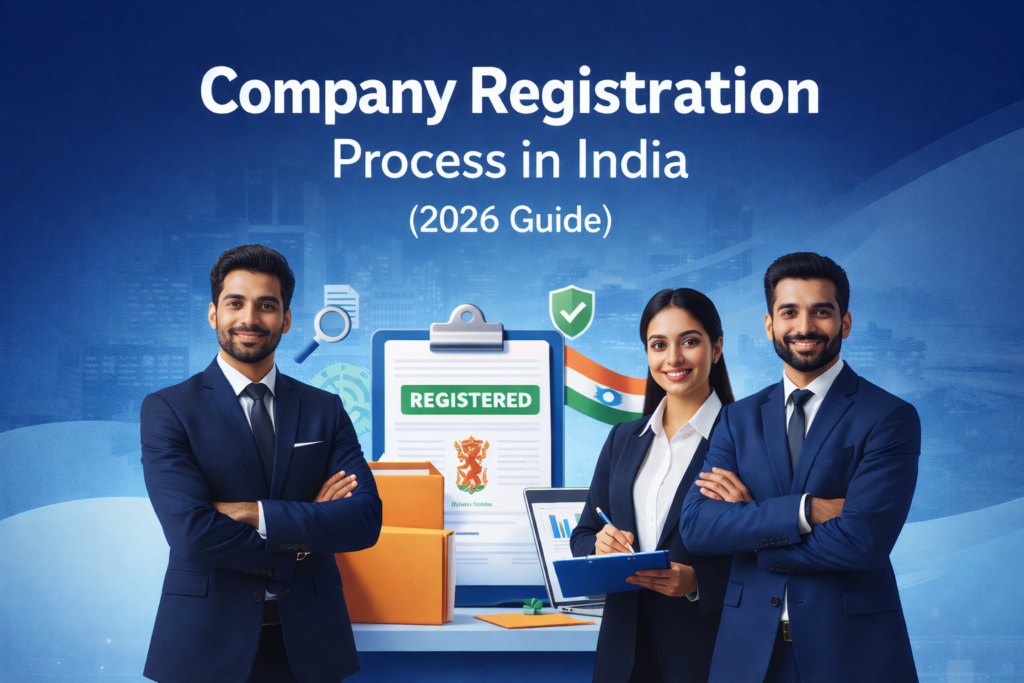Registration of Startups in India: A Complete Step-by-Step Guide

Starting a business in India is an exciting journey, but registration of startups in India is the first and most crucial step toward building a legally compliant and scalable enterprise. Whether you plan to establish a Private Limited Company (Pvt Ltd), Limited Liability Partnership (LLP), or One Person Company (OPC), understanding the registration process can help streamline your business setup.
At Bizsimpl, we streamline Registration of Startups in India so that entrepreneurs can concentrate on expansion while we take care of all the formalities. We will walk you through the advantages, legal frameworks, and exact processes for registering your startup on this blog.
Why is the Registration of Startups in India Important?
Before diving into the process, let’s explore why registration of startups in India is essential:
- A registered corporation has legal status, which facilitates contract signing, intellectual property protection, and fund securing.
- Especially those adopting Pvt Lt and LLP forms, business owners obtain limited liability protection against personal liability for company debts.
- A legally registered firm can draw in investors, get loans, and more quickly raise money.
- Customers, suppliers, and stakeholders of registered companies trust them more than of unregistered companies based on brand credibility.
- Under the Startup India program, the government grants certain tax benefits and incentives for companies.
Now that we understand the importance of the registration of startups in India, let’s explore the different legal structures available.
Legal Structures for Startups in India
When choosing a business structure, startups must consider factors like ownership, liability, and regulatory compliance. Here are the most preferred structures for the registration of startups in India:
- Private Limited Company (Pvtlt)
Because of its scalability and investor-friendly character, a Private Limited Company (Pvt Lt) is the most often used option among startups.
✔ Minimum 2 directors and shareholders required
✔ Limited liability for owners
✔ Easier access to funding from VCs and angel investors
✔ Tax benefits and separate legal identity
- Limited Liability Partnership (llp)
For service-based companies and professional enterprises, an LLP offers the advantages of limited liability together with the adaptability of a partnership.
✔ Minimum 2 partners needed
✔ Limited liability protection
✔ Less compliance load than Pvt Ltd
✔ No mandated minimum capital
- One Person Company (OPC).
Those who seek complete control of their company while still enjoying limited liability and are single entrepreneurs will find an OPC ideal.
✔ Single entrepreneur ownership
✔ Limited liability
✔ Can be converted into a Pvt Ltd as business grows
✔ Separate legal entity ensures business continuity
Starting a company in India requires first selecting the appropriate legal structure. You can start the methodical registration process once you choose the framework.
Step-by-Step Process for the Registration of Startups in India

At Bizsimpl, we handle all documentation and regulatory criteria, therefore simplifying the registration of Indian enterprises. The registration process breaks out here:
Step 1: Obtain Digital Signature Certificate (DSC)
All directors or partners have to have a Digital Signature Certificate (DSC) before seeking for company registration. Online document signing calls for this security.
Step 2: Apply for Director Identification Number (DIN)
Directors of a Pvt Ltd or LLP have to get a Director Identification Number (DIN) from the Ministry of Corporate Affairs (MCA). Company registration requires this unusual count.
Step 3: Name Approval through RUN (Reserve Unique Name) Portal
A business name has to be original and unlike those of already registered companies. Startups may check name availability and receive clearance using the MCA’s RUN portal.
Step 4: Draft and File Incorporation Documents
For Pvt Lt. or LLP agreement, this covers submitting MOA (Memorandum of Association) and AOA (Articles of Association). These records show the goals and running policies of the business.
Step 5: Get Certificate of Incorporation (COI)
The MCA legally recognises the startup with a Certificate of Incorporation once all paperwork are checked. The COI is evidence of startups registered in India.
Step 6: Apply for PAN & TAN
Tax filing and financial activities call for a permanent account number (PAN) and tax deduction and collection account number (TAN).
Step 7: Open a Business Bank Account
Managing transactions calls for a company bank account. Startups opening an account must turn in their COI, PAN, and other KYC paperwork.
How Bizsimpl Simplifies the Registration of Startups in India
Navigating legal procedures can be overwhelming, but Bizsimpl makes the registration of startups in India seamless with:
✔ End-to- End Documentation Support: From DSC to COI, we manage all documentation.
✔ Fast Processing: Our staff guarantees a seamless registration process free of little delays.
✔ Reasonably Cost: Open pricing free of hidden expenses.
✔ Expert Consultation: Get professional advice regarding the appropriate corporate structure.
Frequently Asked Questions (FAQs) on Registration of Startups in India
- How long is it necessary to finish registering Indian startups?
Usually depending on document verification and clearances, the whole procedure takes 7–15 days.
- Could one person launch a Private Limited Company?
No, a Pvt Lt corporation calls for at least two directors. One individual, though, can register an OPC (one person company). - Does startups have to register for GST?
If your company’s revenue is more than ₹20 lakh (₹10 lakh for special category states) or if you deal across states, GST registration is required. - Minimum money needed for startup registration?
In India, registering a Pvt Lt. LTD., LLP, or OPC does not call for minimum capital requirements. - Are there government advantages given to startups?
Indeed, qualified entrepreneurs under the Startup India Initiative benefit from tax benefits, simpler access to capital, and relaxed compliance rules.
Post-Registration Compliance for India’s Startups
Once the registration of startups in India is complete, entrepreneurs must fulfill certain compliance requirements to keep their business legally operational. Here’s what you need to know:
- Business Permissions and Licences
Your company type will determine if you require further registrations including:
Shops and Establishment License: Needed for retail outlets or actual offices.
FSSAI License: Requiring for companies connected to food.
✔ MSME Registration: Advantageous for small companies to apply government grants. - Annual Compliance OPC, Pvt LTD, LLP
Once startups have registered in India, companies have to follow yearly compliance rules:
✔ Income Tax Filing; ✔ Maintaining Books of Accounts; ✔ Filing Annual Returns with the Ministry of Corporate Affairs (MCA); ✔ Board Meetings (For Pvt Lt Companies)
Ignoring rules could lead to fines or maybe the closing of your company. This is why effective compliance management depends on having professionals like Bizsimpl.
Government Policies and Advantages for Indian Startups
By means of several startup-friendly regulations, the Indian government actively fosters fresh firms. Following the registration of Indian startups, companies can seek for many advantages including:
- Initiative on Startup India
The Startup India initiative provides: fast-track patent application processing; tax breaks for qualified companies for up to three years; self-certification for labour and environmental regulations. - DPIIT Awards
Startups registered under Department for Promotion of Industry and Internal Trade (DPIIT) have access to: government bids free of prior experience requirements; easier compliance procedures; lower intellectual property registration fees. - Fund of Funds for Startups (FFS)
Under this program, Indian government invests in startups via SEBI-registered venture capital firms, so assisting companies in capital raising.
These advantages make registration of startups in India even more important for business owners trying to scale rapidly.
Common Challenges in Startup Registration and How Bizsimpl Helps
Although registering a startup in India follows a set procedure, many entrepreneurs deal with issues including:
While the registration of startups in India is a structured process, many entrepreneurs face challenges such as:
🚩 Choosing the Right Business Structure – Pvt Ltd, LLP, or OPC? Bizsimpl helps you select the best structure based on your business needs.
🚩 Complex Documentation – Many founders struggle with filing MOA, AOA, DIN, and DSC. Bizsimpl handles all documentation, ensuring accuracy.
🚩 Delays in Approval – Government portals often have processing delays. Bizsimpl expedites your registration of startups in India with expert handling.
🚩 Compliance Confusion – Post-registration formalities can be overwhelming. Bizsimpl provides continued support for annual compliance.
With Bizsimpl, you can complete the registration of startups in India effortlessly, avoiding unnecessary hurdles.
How can one start using Bizsimpl for Startup Registration?

Starting your business with Bizsimpl is simple! Just do these:
✔ Step 1: Visit Bizsimpl.com
✔ Step 2: Choose your chosen business structure (Pvt Lt, LLP, OPC);
✔ Step 3: Send your documentation online;
✔ Step 4: Our analysts handle your registration with MCA.
✔ Step 5: Start your company using your Certificate of Incorporation.
Our knowledgeable staff guarantees 100% compliance, quick approvals, and hassle-free startup registration so you may concentrate on expansion of your company.
Finally, why should you register your startup today?
First towards creating a profitable, legally compliant company is registering startups in India. Whether your preferred form of business is a Private Limited Company (Pvt Lt), Limited Liability Partnership (LLP), or One Person Company (OPC), a registered company gives legitimacy, legal protection, and government benefit access.
Using Bizsimpl guarantees compliance and efficiency by means of an expert partner simplifying your startup registration process. Don’t wait—register your startup right now to formally name your company!
Ready to Register Your Startup? Let Bizsimpl Handle It for You!
Take the first step towards your entrepreneurial journey with Bizsimpl—your trusted partner for the registration of startups in India.
📞 Contact us today!
🌐 Visit: Bizsimpl.com
🚀 Start your business with confidence!
Blog's
Company Registration in Bangalore with BizSimpl Consultancy
Company Registration in Bangalore: Step-by-Step Guide for Startups Company Registration in Bangalore is the first…
Process for Registering a Company in India: Step-by-Step
On This Page What Company Registration Means End-to-End Registration Process Overview Types of Company Structures…
Startup Incorporation in India: Essential Steps and Benefits for New Entrepreneurs
Startup Incorporation in India: Essential Steps and Benefits for New Entrepreneurs India has quickly developed…











